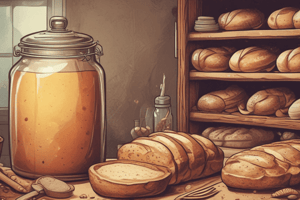Podcast
Questions and Answers
What two components of dough making are affected by the amount of water in the dough?
What two components of dough making are affected by the amount of water in the dough?
Fermentation rate and type, and dough structure
What is the role of amylase in fermentation, and what is required for it to function?
What is the role of amylase in fermentation, and what is required for it to function?
Amylase degrades starch into sugars, and it requires sufficient water to do so.
How does an excess of water affect gluten bonds in dough?
How does an excess of water affect gluten bonds in dough?
Excess water creates an ideal environment for enzyme activity, which weakens gluten bonds.
What is the effect of dry dough on its texture and structure?
What is the effect of dry dough on its texture and structure?
Why do some artisan bakers prefer to use spring water in their dough?
Why do some artisan bakers prefer to use spring water in their dough?
What is the effect of mineral content in hard tap water or well water on dough?
What is the effect of mineral content in hard tap water or well water on dough?
What is the consequence of using soft water with low mineral content in dough making?
What is the consequence of using soft water with low mineral content in dough making?
What is the general effect of water on yeast and bacteria in dough?
What is the general effect of water on yeast and bacteria in dough?
Flashcards are hidden until you start studying
Study Notes
Water in Dough Making
- Water is a critical ingredient in dough making, as yeast and bacteria cannot thrive without sufficient water.
Effects of Water on Fermentation
- Adding or subtracting water from a dough or pre-ferment can have profound effects on the rate and type of fermentation.
- Amylase, an enzyme critical to fermentation, cannot degrade starch into sugars without sufficient water.
Effects of Water on Dough Structure
- Gluten cannot form in the absence of water.
- Excess water creates an ideal environment for enzyme activity, weakening gluten bonds and sometimes creating stickier dough.
- Dry dough tends to be stronger, with a close, cottony crumb, while extra water can ensure a more extensible dough with large, irregular holes and a chewy texture.
Source of Water
- Some artisan bakers use spring water to avoid chlorine or other additives in tap water.
- Tap water is usually fine for most artisan bakers, except in rare cases of contamination of the water source.
- Mineral content of hard tap water or well water can give dough greater strength and benefit fermentation.
- Soft water tends to lengthen fermentation times and may give dough an unusual level of extensibility.
- Filtration systems can be installed to address issues with water quality or additives.
Addressing Water Issues
- Extending fermentation times or adding sets of folds during bulk fermentation can address lack of strength from too-soft water.
Studying That Suits You
Use AI to generate personalized quizzes and flashcards to suit your learning preferences.




